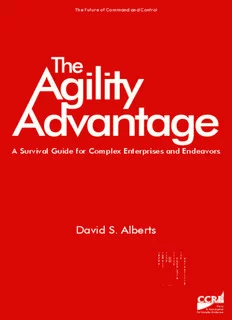Table Of Contentree敏rαrr
ell捷éνee
The Future of Command and Controlsaa sθss
iss iεii
ltt lκls
iii iτit
êzc eιee
nii nκnn
ctt cόcc
iäà eτei
at a 彈性 lητ a
d 'α
a a
t d
t a
a p
b t
i a
l b
aai適iιaa
dnt應lκdd
apà性iαaa
pa tνpp
ts éόtt
as τaa
bu ηbb
in τii
lg αll
is πii
dfi創lρtd
aän新'οya
dhn iσ d
eio nα
gv nρ
ka oμ
et vο
ii aγ
tv tή
i iς
iit響o ic
nnà應n na
on np
vo oa
av vc
ça ai
ãt td
oi ia
o vd
cnsr多rκen d
ake功éαee
A Survival Guide for Complex Enterprisepasra ata能 nacdινss E indeavors
cft tο n
iti iτ n
d v vο o
a i iμ v
d t tι a
e à éκ c
dre v敏捷 poότreió
eae lηsn
rktrs yvταpo
eia a n
sot l s
pni e i
osl n v
sfi c e
tät彈eαns
ahà性 νee
i τsn
g αss
k π i
e ό b
i κ i
t ρ l
ι i
David S. Alberts σ d
vvf適lηva
eil應aςed
ree性 f r
sls l s
ass e a
tei x t
iib i i
lti b l
iil i i
dgi l t
akt創iεyv
deà新tυ e
ei éε r
t λ s
ι a
ξ t
ί i
α l
i
d
ff 響 εfa
ll 應 υld
ee εe
xx λx
ii ιi
bb ξb
ii ίi
ll αl Focus
ii i & Convergence
dt t for Complex Endeavors
aä 多 yf
dt 功 l
A CCRP
BOUT THE
The Command and Control Research Program (CCRP) has
the mission of improving DoD’s understanding of the national
security implications of the Information Age. Focusing upon
improving both the state of the art and the state of the prac-
tice of command and control, the CCRP helps DoD take full
advantage of the opportunities afforded by emerging technol-
ogies. The CCRP pursues a broad program of research and
analysis in information superiority, information operations,
command and control theory, and associated operational con-
cepts that enable us to leverage shared awareness to improve
the effectiveness and efficiency of assigned missions. An impor-
tant aspect of the CCRP program is its ability to serve as a
bridge between the operational, technical, analytical, and edu-
cational communities. The CCRP provides leadership for the
command and control research community by:
• articulating critical research issues;
• working to strengthen command and control research
infrastructure;
• sponsoring a series of workshops and symposia;
• serving as a clearing house for command and control
related research funding; and
• disseminating outreach initiatives that include the
CCRP Publication Series.
This is a continuation in the series of publications pro-
duced by the Center for Advanced Concepts and
Technology (ACT), which was created as a “skunk works”
with funding provided by the CCRP under the auspices
of the Assistant Secretary of Defense (NII). This program
has demonstrated the importance of having a research
program focused on the national security implications of
the Information Age. It develops the theoretical founda-
tions to provide DoD with information superiority and
highlights the importance of active outreach and dissem-
ination initiatives designed to acquaint senior military
personnel and civilians with these emerging issues. The
CCRP Publication Series is a key element of this eff ort.
Check our website for the latest CCRP activities and publications.
www.dodccrp.org
Focus
& Convergence
for Complex Endeavors
DoD Command and Control Research Program
Department of Defense
Chief Information Offi cer
Ms. Teri M. Takai
&
Director of Research
Dr. David S. Alberts
Opinions, conclusions, and recommendations expressed or implied
within are solely those of the authors. They do not necessarily
represent the views of the Department of Defense, or any other
U.S. Government agency. Cleared for public release; distribution
unlimited.
Portions of this publication may be quoted or reprinted without
further permission, with credit to the DoD Command and Control
Research Program, Washington, D.C. Courtesy copies of reviews
would be appreciated.
Library of Congress Cataloging-in-Publication Data
Alberts, David S. (David Stephen), 1942-
The agility advantage : a survival guide for complex enterprises
and endeavors / David S. Alberts.
p. cm.
Includes bibliographical references and index.
ISBN 978-1-893723-23-8
1. Organizational eff ectiveness--Evaluation--Methodology.
2. Adaptability (Psychology) 3. Complexity (Philosophy) 4.
Command and control systems--Evaluation. 5. United States.
Dept. of Defense. 6. United States--Armed Forces--Organization.
I. Title. II. Title: Survival guide for complex enterprises and
endeavors.
HD58.9.A445 2011
355.6’84--dc23
2011037767
September 2011
The Agility
Advantage
A Survival Guide
for
Complex Enterprises
and
Endeavors
David S. Alberts
Table of Contents
List of Figures ..........................................................................................xi
Acknowledgments ..................................................................................xxi
Prologue
A Call to Action ...............................................................3
1. Agility Myths ..................................................................................7
2. Organization of this Book ...........................................................17
Part I
Fundamental Concepts ..................................................23
3. Problem Diffi culty ........................................................................25
4. Complexity ....................................................................................47
5. Introduction to Agility .................................................................61
Part II
A New Age ..........................................................................75
6. Understanding a New Age .........................................................81
vii
7. The Information Age ....................................................................91
8. An Information Age Military ....................................................119
9. A Dawning of a New Age .........................................................141
Part III
A Plan to Improve Agility ..........................................161
10. Accept Reality and the Agility Imperative .............................163
11. Understand and Improve Agility .............................................179
Part IV
Understanding Agility ................................................185
12. Defi ning Agility ..........................................................................187
13. Basics of Agility ..........................................................................197
14. Components of Agility ..............................................................203
15. Conceptual Model of Agility ....................................................229
16. From Manifest Agility to Potential Agility .............................245
17. Agility Related Hypotheses ......................................................255
18. Measuring Agility .......................................................................271
Part V
Agility Experiments and Analysis ............................283
19. Experimental Campaign Framework ......................................287
viii
Description:A Survival Guide for Complex Enterprises and Endeavors. David S. Alberts. Focus Members of the NATO Research Group SAS-085, which. I am fortunate to

